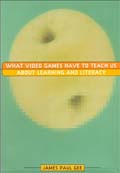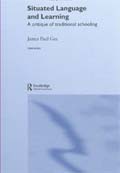(click on a book or book title for purchasing information or more reviews)
 What Video Games Have to Teach Us About Learning and Literacy
What Video Games Have to Teach Us About Learning and Literacy
by James Paul Gee
A few short reviews from amazon.com:
“[Gee is] a serious scholar who is taking a lead in an emerging field.”–Scott Carlson, Chronicle of Higher Education
“Am I a bad parent for letting [my child] play video games at 4? Not at all, according to Gee.”–Jim Louderback, USA Weekend Magazine
“Rather than be reined in, today’s successful game designers should be recognized as modern masters of learning theory…”–Mike Snider, Cincinnati Enquirer
 Why Video Games are Good for Your Soul by James Paul Gee
Why Video Games are Good for Your Soul by James Paul Gee
Excerpted from book description on amazon.com:
Why Video Games are Good for Your Soul is about pleasure and learning. Good video games allow people to create their own “music”, to compose a symphony from their own actions, decisions, movements, and feelings. They allow people to become “pros”, to feel and act like an expert soldier, city planner, world builder, thief, tough guy, wizard and a myriad of other things. They allow people to create order out of complexity, to gain and feel mastery, and to create new autobiographies, careers and histories.
 Situated Language and Learning; A Critique of Traditional Schooling
Situated Language and Learning; A Critique of Traditional Schooling
by James Paul Gee
Excerpted from book description on amazon.com:
Why do poor and minority students under-perform in school? Do computer games help or hinder learning? What can new research in psychology teach educational policy-makers?
In this major new book, James Gee tackles the ‘big ideas’ about language, literacy and learning, applying his findings to real problems facing educationalists today.
He tackles controversial debates such as the New Literacy Studies, and the idea that the academic language required to study, for example, Mathematics and the Sciences, is exclusionary and places unfair demands on poor and minority students. Gee also explores learning outside the classroom, looking at computer and video games and comparing the way a child interacts with others and technology to learn and play, with school-based learning in science classrooms.
